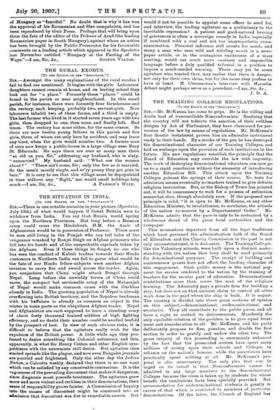THE SITUATION IN INDIA.
[TO TRH EDITOR OF Tint SetzersTon."]
SIR,—There is one notable omission in your picture (Spectator, July 13th) of what would happen if Great Britain were to withdraw from India. You say that Russia would spring upon the Northern Provinces. But long before a Russian army could cross the Hindukush, H.M. the Amir of Afghanistan would be in possession of Peshawar. There must be men still living in the Punjab who can tell tales of the vengeance wreaked by Ranjit Singh on Afghan prisoners who fell into his hands and of the unspeakable reprisals taken by the Afghans. Even if these things be forgot, no one who has seen the conduct of Kabuli traders towards their Hindu customers in Northern India can fail to guess what would be the fate of our Hindu fellow-subjects were another Afghan invasion to carry fire and sword across the border. Again, you conjecture that China might attack Bengal through Nepal. Long before the unwieldy forces of China could move, the compact but serviceable army of the Maharajah of Nepal would make common cause with the Gurkhas already in India. The growing population of Nepal is already overflowing into British territory, and the Nepalese herdsman with his bnffaloes is already as common an object in the winter in some parts as the ubiquitous Afghan trader. Nepal and Afghanistan are each supposed to have a standing army of about forty thousand trained soldiers of high fighting efficiency, and no doubt their number could be swelled tenfold by the prospect of loot. In view of such obvious risks, it is difficult to believe that the agitators really wish for the expulsion of the British power. A little while ago they pro- fessed to desire something like Colonial autonomy, and this, apparently, is what Sir Henry Cotton and other English sym- pathisers with the extremists still desire. But agitation once started spreads like the plague, and now even Bengalee journals are puzzled and frightened. Only the other day the Indian Nation, a Calcutta weekly, declared that there is no one want which can be satisfied by any conceivable concessions. It is the vagueness of the prevailing discontent that makes it dangerous, since diagnosis must precede treatment. The agitators grow more and more violent and reckless in their denunciations, their sense of responsibility grows fainter. A Commission of Inquiry into the causes of discontent might be construed into an admission that discontent was due to remediable causes. But would it not be possible to appoint some officer to send for, and interview, the leading agitators as a preliminary to the inevitable repression ? A patient and good-natured hearing of grievances is often a sovereign remedy in India. especially if combined with a cool and not too unsympathetic cross- examination. Personal influence still counts for much, and many a man who uses wild and whirling words in a news- paper article, or in the contagious excitement of a mass meeting, would use much more cautious and responsible language before a duly qualified tribunal in a position to impose a much-needed warning. There may yet be some agitators who, treated thus, may realise that there is danger, not only for their own skins, but for the cause they profess to have at heart. M. Clemenceau's interview with •Marcella Albert might perhaps serve as a precedent. —I am, Sir, &c., J. D. A.






































 Previous page
Previous page